【培优讲义】第9讲 英语牛津深圳版 七年级上册 Module1-Module2 复习
文档属性
| 名称 | 【培优讲义】第9讲 英语牛津深圳版 七年级上册 Module1-Module2 复习 | 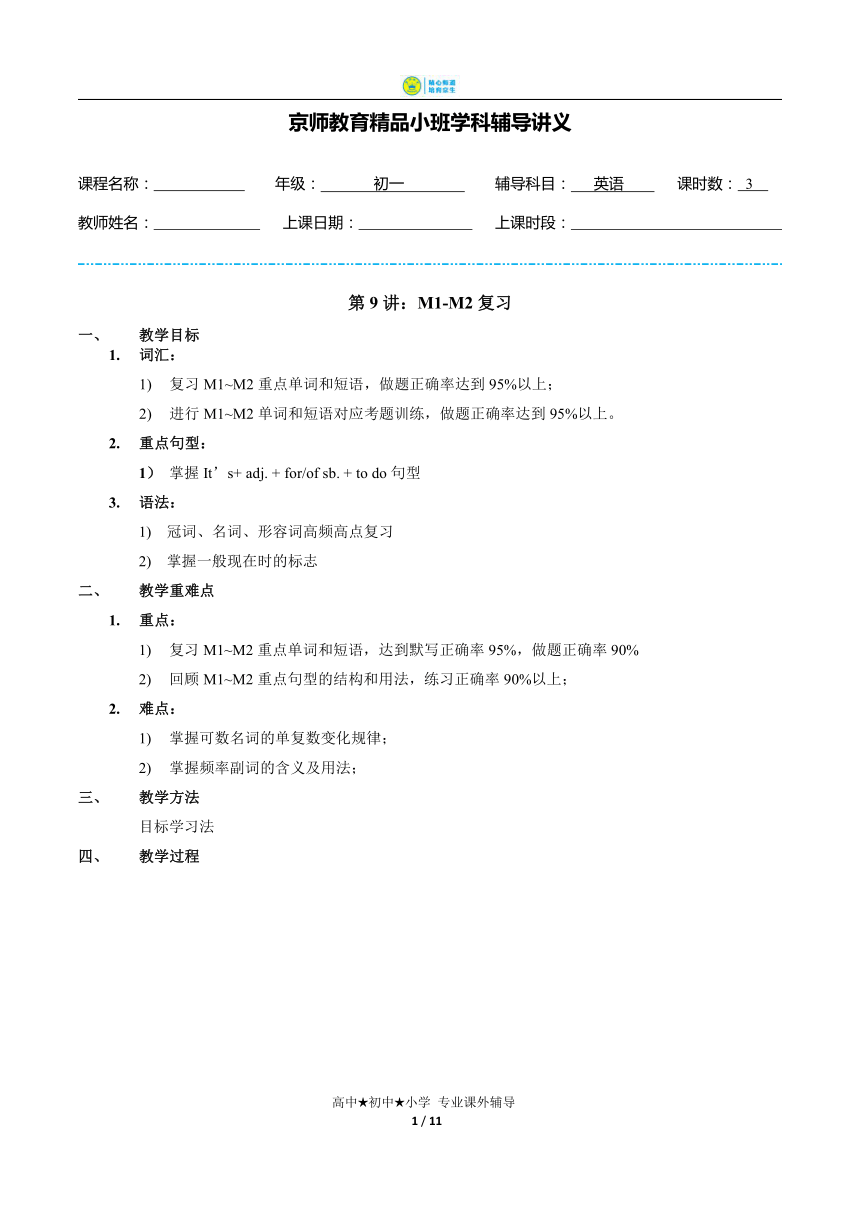 | |
| 格式 | doc | ||
| 文件大小 | 284.6KB | ||
| 资源类型 | 试卷 | ||
| 版本资源 | 牛津深圳版 | ||
| 科目 | 英语 | ||
| 更新时间 | 2021-12-11 09:58:22 | ||
图片预览

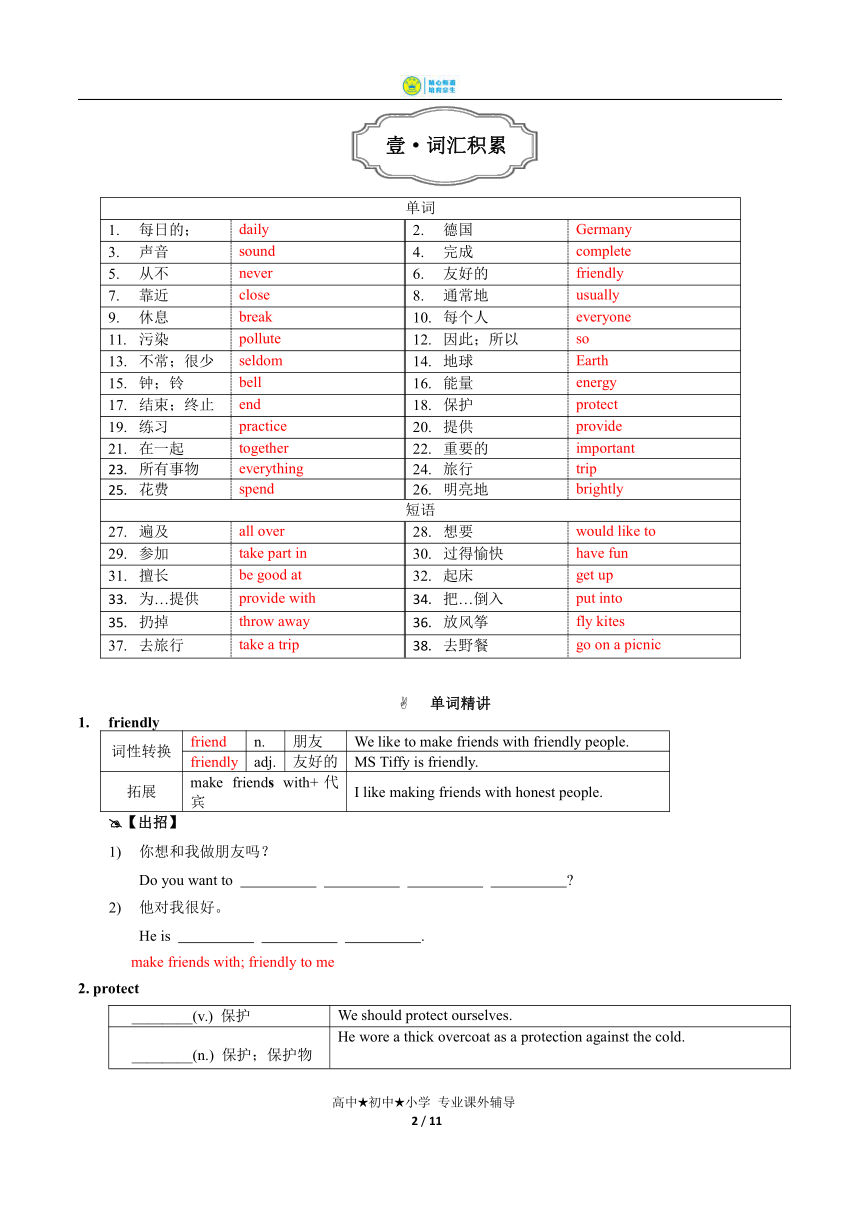
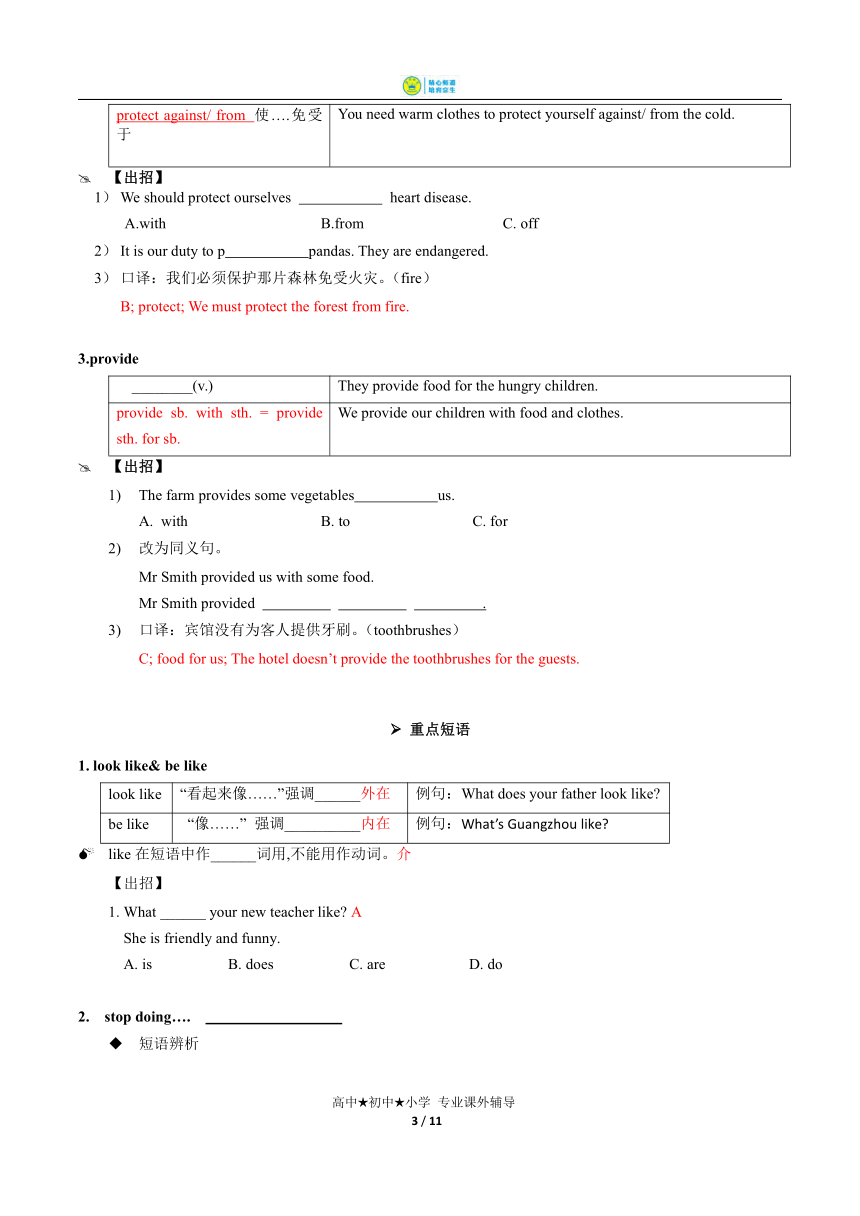
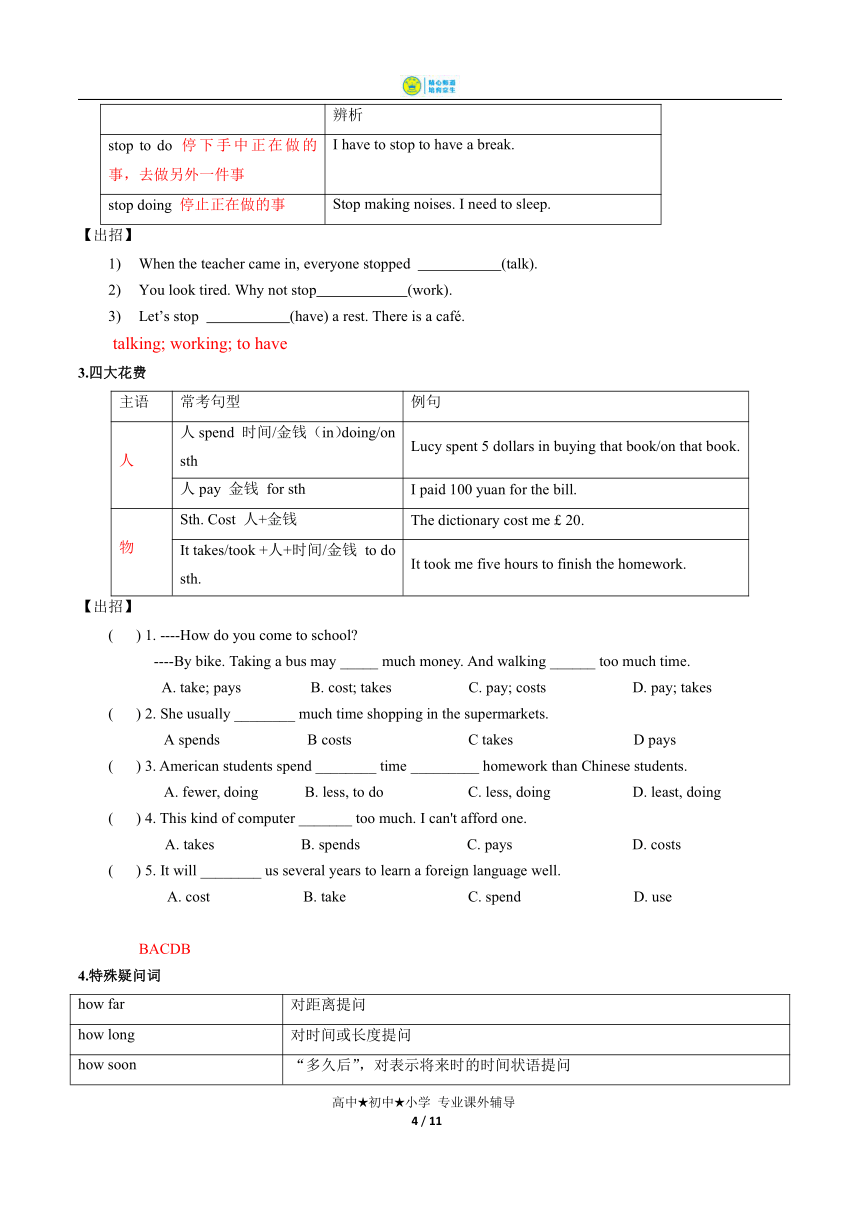
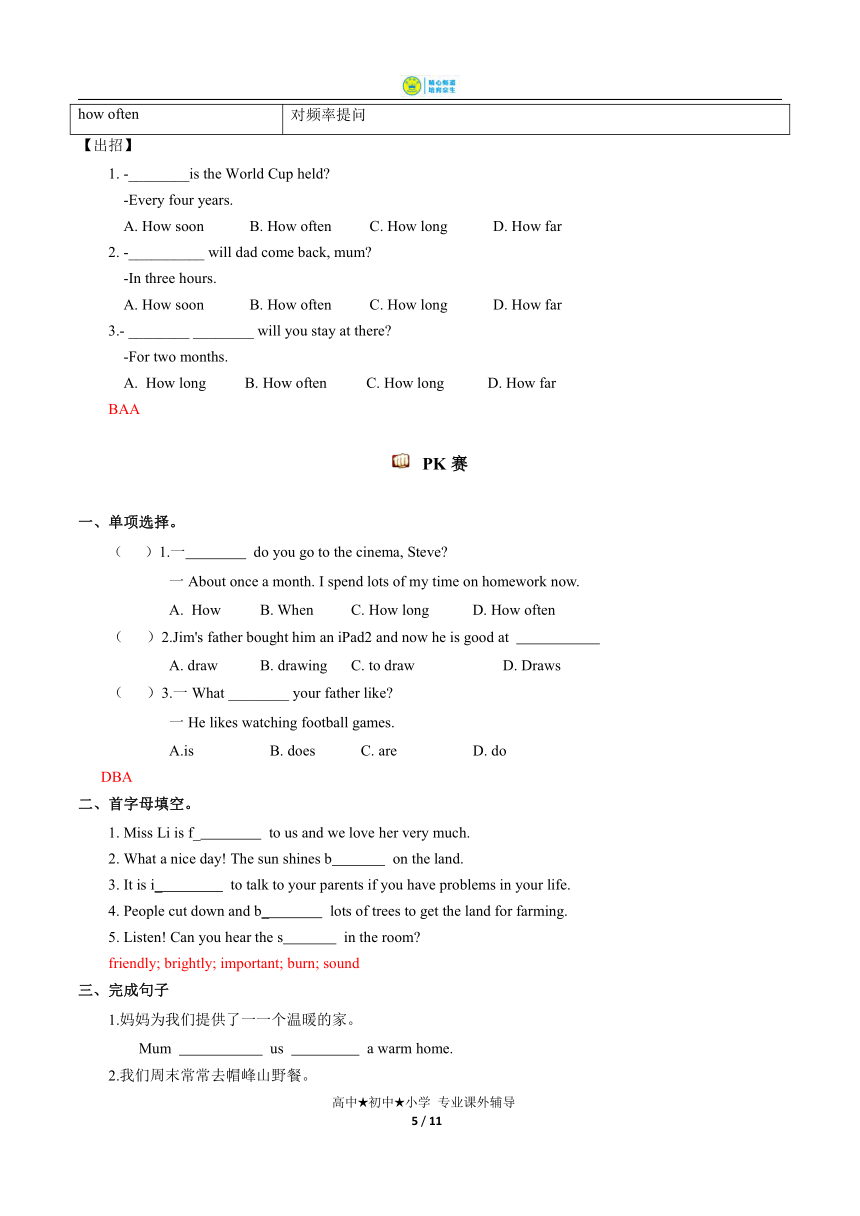
文档简介
京师教育精品小班学科辅导讲义
课程名称: 年级: 初一 辅导科目: 英语 课时数: 3
教师姓名: 上课日期: 上课时段:
第9讲:M1-M2复习
教学目标
词汇:
复习M1~M2重点单词和短语,做题正确率达到95%以上;
进行M1~M2单词和短语对应考题训练,做题正确率达到95%以上。
重点句型:
掌握It’s+ adj. + for/of sb. + to do句型
语法:
冠词、名词、形容词高频高点复习
掌握一般现在时的标志
教学重难点
重点:
复习M1~M2重点单词和短语,达到默写正确率95%,做题正确率90%
回顾M1~M2重点句型的结构和用法,练习正确率90%以上;
难点:
掌握可数名词的单复数变化规律;
掌握频率副词的含义及用法;
教学方法
目标学习法
教学过程
单词
每日的; daily 德国 Germany
声音 sound 完成 complete
从不 never 友好的 friendly
靠近 close 通常地 usually
休息 break 每个人 everyone
污染 pollute 因此;所以 so
不常;很少 seldom 地球 Earth
钟;铃 bell 能量 energy
结束;终止 end 保护 protect
练习 practice 提供 provide
在一起 together 重要的 important
所有事物 everything 旅行 trip
花费 spend 明亮地 brightly
短语
遍及 all over 想要 would like to
参加 take part in 过得愉快 have fun
擅长 be good at 起床 get up
为…提供 provide with 把…倒入 put into
扔掉 throw away 放风筝 fly kites
去旅行 take a trip 去野餐 go on a picnic
单词精讲
friendly
词性转换 friend n. 朋友 We like to make friends with friendly people.
friendly adj. 友好的 MS Tiffy is friendly.
拓展 make friends with+代宾 I like making friends with honest people.
【出招】
你想和我做朋友吗?
Do you want to
他对我很好。
He is .
make friends with; friendly to me
2. protect
________(v.) 保护 We should protect ourselves.
________(n.) 保护;保护物 He wore a thick overcoat as a protection against the cold.
protect against/ from 使….免受于 You need warm clothes to protect yourself against/ from the cold.
【出招】
We should protect ourselves heart disease.
A.with B.from C. off
It is our duty to p pandas. They are endangered.
口译:我们必须保护那片森林免受火灾。(fire)
B; protect; We must protect the forest from fire.
3.provide
________(v.) They provide food for the hungry children.
provide sb. with sth. = provide sth. for sb. We provide our children with food and clothes.
【出招】
The farm provides some vegetables us.
with B. to C. for
改为同义句。
Mr Smith provided us with some food.
Mr Smith provided .
口译:宾馆没有为客人提供牙刷。(toothbrushes)
C; food for us; The hotel doesn’t provide the toothbrushes for the guests.
重点短语
1. look like& be like
look like “看起来像……”强调______外在 例句:What does your father look like
be like “像……” 强调__________内在 例句:What’s Guangzhou like
like在短语中作______词用,不能用作动词。介
【出招】
1. What ______ your new teacher like A
She is friendly and funny.
A. is B. does C. are D. do
2. stop doing….
短语辨析
辨析
stop to do 停下手中正在做的事,去做另外一件事 I have to stop to have a break.
stop doing 停止正在做的事 Stop making noises. I need to sleep.
【出招】
1) When the teacher came in, everyone stopped (talk).
2) You look tired. Why not stop (work).
3) Let’s stop (have) a rest. There is a café.
talking; working; to have
3.四大花费
主语 常考句型 例句
人 人spend 时间/金钱 (in)doing/on sth Lucy spent 5 dollars in buying that book/on that book.
人pay 金钱 for sth I paid 100 yuan for the bill.
物 Sth. Cost 人+金钱 The dictionary cost me 20.
It takes/took +人+时间/金钱 to do sth. It took me five hours to finish the homework.
【出招】
( ) 1. ----How do you come to school
----By bike. Taking a bus may _____ much money. And walking ______ too much time.
A. take; pays B. cost; takes C. pay; costs D. pay; takes
( ) 2. She usually ________ much time shopping in the supermarkets.
A spends B costs C takes D pays
( ) 3. American students spend ________ time _________ homework than Chinese students.
A. fewer, doing B. less, to do C. less, doing D. least, doing
( ) 4. This kind of computer _______ too much. I can't afford one.
A. takes B. spends C. pays D. costs
( ) 5. It will ________ us several years to learn a foreign language well.
A. cost B. take C. spend D. use
BACDB
4.特殊疑问词
how far 对距离提问
how long 对时间或长度提问
how soon “多久后”,对表示将来时的时间状语提问
how often 对频率提问
【出招】
1. -________is the World Cup held
-Every four years.
A. How soon B. How often C. How long D. How far
2. -__________ will dad come back, mum
-In three hours.
A. How soon B. How often C. How long D. How far
3.- ________ ________ will you stay at there
-For two months.
How long B. How often C. How long D. How far
BAA
PK赛
单项选择。
( )1.一 do you go to the cinema, Steve
一About once a month. I spend lots of my time on homework now.
How B. When C. How long D. How often
( )2.Jim's father bought him an iPad2 and now he is good at
A. draw B. drawing C. to draw D. Draws
( )3.一What ________ your father like
一He likes watching football games.
A.is B. does C. are D. do
DBA
首字母填空。
1. Miss Li is f_ to us and we love her very much.
2. What a nice day! The sun shines b on the land.
3. It is i_ to talk to your parents if you have problems in your life.
4. People cut down and b_ lots of trees to get the land for farming.
5. Listen! Can you hear the s in the room
friendly; brightly; important; burn; sound
三、完成句子
1.妈妈为我们提供了一一个温暖的家。
Mum us a warm home.
2.我们周末常常去帽峰山野餐。
We often in the Maofeng Mountain at weekends.
3.因为奶奶家离流花公园很近,所以她每天都去那里运动。
As grandma lives the Liuhua Park, she does sports there everyday.
4.早上早起床对你的健康有好处。
is good for your health early in the morning.
5.过春节时,孩子们通常过得很高兴。
Children enjoy themselves during the Spring Festival.
provides with; go on a trip; close to; It, to get up; usually
It’s + 形容词 + for +名词/代词+to do.
例:It’s important for us to protect the earth.
It’s easy for me to solve this problem.
节约用水对于我们来说很重要。(save the water, important)
It’s important for us to save the water.
It’s + 形容词 + of+名词/代词+to do.
例:It’s very kind of you to help me.
It’s very smart of her to solve the problem.
犯这样的错误,你真是太笨了。( )
It’s foolish of you to make this mistake.
【出招】
( ) 1. Jim wants to be musician, so it’s important _______him _______the piano well.
A. for; play B. of; to play C. for; Cto play D. of; playing
( ) 2. It is kind ______ you to help so many people.
A. of B. for C. with D. about
3.学习英语对于我来说很容易。
4. 学会保护自己对我们来说很有必要。(protect ourselves, necessary)
5.帮助我,你真是太好了。
CA; It’s easy for me to learn English. It’s necessary for us to protect ourselves.
It’s nice of you to help me.
冠词
零冠词 一日三餐、球类运动、棋类、牌类无需冠词
the The 一般用于 (特指/泛指)某一事物 (西洋/中国)乐器前必须使用定冠词the
an 某个字母单独出现 Mr. Li has one fox. 特例: hour; honest; island
a 一般用于辅音字母前 特例: useful, UFO, uniform, Europe, university
【出招】
( ) 1. I like playing ______ chess, but Tom likes playing ______ piano.
A. the; a B. a; the C. /; the D. /; /
( ) 2. Anna has ______ uncle. Her uncle has ______ useful look.
A. a; a B. an; an C. a; an D. an; a
( ) 3. There is _____ “n” and _____ “u” in the word number.
A. a; a B. an; a C. a; an D. an; an
CDB
名词
可数名词的单复数 以“o”结尾有生命,加 变复数,以“o”结尾无生命,加 变复数。 变人有单复。中日不变,英法变 。
可数& 不可数名词 液体、肉类、面包不可数 谓语用 little和a little都修饰 ,few和a few修饰 。 不可数名词的量 a piece of,a bottle of,a glass of,two cups of
【出招】
( ) 1. -- Can I help you, sir -- Yes, I would like five ______.
A. meat B. potatos C. potatoes D. banana
( ) 2. I will go to buy some ______, there is little left.
A. juice B. breads C. apples D. oranges
CA
形容词
形容词的位置 不定代词后 如某些重要的事情 something important 足够前 如足够长 long enough 名词前 如一个漂亮的女孩 a beautiful girl Be动词后 如她很漂亮 She is beautiful.
-ed/-ing 通常用来描述事物 通常描述人
后接形容词的V 感官: look; sound; smell; taste; feel; touch 变: get; become; grow; go; turn(+颜色) make+ adj. keep+ adj.
【出招】
( ) 1. --- What about doing for the homeless people
--- Good idea.
A. anything helpful B. something helpful C. helpful something
( ) 2. --- Have you heard the song Stay Here Forever
--- Yes. It sounds .
A. well B. loudly C. sweet D. beautifully
( ) 3. I was ill. I caught a cough yesterday.
A. bad; bad B. badly; bad C. bad; badly D. badly; badly
BCB
一般现在时
频率副词 always, usually, often, seldom, rarely , never 2.位置:be动词,助动词,情态动词的 后面,行为动词的 前面。
【出招】
( ) 1.--Do you often go to the gym
---No, ________. I do not like sports at all.
always B. never C. sometimes D. usually
( ) 2. He is ______ busy working, so he ______ goes traveling.
A. sometimes; always B. always; often
C. always; seldom D. never; seldom
( ) 3. Sandy is so careful that she ___ makes mistakes in her homework.
A. usually B. seldom C. often D. always
( ) 4. ---______ do you go to see a film
---Sometimes. Maybe once a month.
A.How long B. What time C. When D. How often
( ) 5. ---Can your father drive ---Yes, and he usually ___ to work.
A. drove B. is driving C. drives D. has driven
BCBDC
出招
单项选择。
( ) 1. _______ woman over there is _______ popular teacher in our school.
A. A; an B. The; a C. The; the D. A; the
( ) 2. His father is _______ English teacher. He works in our school.
A. a B. an C. the D./
( )3. Does Tom often play _______ football after _______ school?
A./;/ B./;the C. the; / D. a; /
( ) 4. One afternoon he found _______ handbag. There was _______ “s” on the corner of _______ handbag.
A, a; an; the B. a; a; the C. an; an; an D. the; a; a
( ) 5.There are a lot of _______ down there but hardly any _______.
A. sheeps, people B. sheep, people
C. sheeps, peoples D. sheep, peoples
( ) 6.Mr. Smith always has _______ to tell us.
A. some good pieces of news B. some pieces of good news
C. some good piece news D. some piece good of news
( ) 7.What big____ the tiger has!
tooth B. teeth C. tooths D. toothes
( ) 8.I have to tell you.
important something B. something important
C. anything important D. important anything
DBAAB BBB
重点单词 友好的
Protect的v. n.的用法
Provide的v. n. 形式及搭配用法等
重点短语 look like& be like的区别
Stop doing
四大花费
特殊疑问词
重点句型 It’s+ adj. + for/of sb. + to do句型
冠词 零冠词的用法
The一般用在
a ;an 在单词及字母前的区别
名词 可数名词单复数变化
可数& 不可数名词
形容词 形容词的位置
-ed/-ing
频率副词 always, usually, often, seldom, rarely , never
一、根据下列句子及所给单词的首字母写出所缺单词。
1. In the morning, we u________ study Chinese, Maths and English.
2. You can ask your mum for help if you can’t do it y________.
3. My h_____ is collecting stamps.
4. It’s Tom’s d_______ to be a singer.
5. I usually c______ my homework before 7:30 p.m., and then I can watch cartoons.
usually; yourself; hobby; dream; complete
二、完型填空。
Mike is an Englishman. He lives in a 1._____ building in the 2._____ London.There are eighteen floors in the building and he lives on the fifteenth floor. He3.______ a lift(电梯梯) to go up and down. He works very hard.He4_____ to work early.Every day he leaves his 5.______ and walks to the lift. He gets into the lift. It 6._____him down to the first floor. He gets out of the lift. Then he 7.______ to a bus stop. The bus stop is in front of a station. It is about two hundred meters from his home.8._______he catches the No II bus to work, but sometimes he goes by bike. He works in a factory about ten 9.______ from his home. His work 10._____ at half past eight, and finishes at a quarter to five. He gets back home at half past five.
( )1A. tall B. short C .small
( )2.A. country B. town C. city
( )3. A. makes B. uses C. does
( )4. A. begins B. wants C. goes
( )5. A. home B. building C office
( )6. A. cost: B. spends C. takes
( )7. A. rides B. walks C. drives
( )8. A. Usually B. Suddenly C. Hardly
( )9.A .ways B. minutes C. kilometers
( )10. A. ends B. starts C.continues
A C B C A C B A C B
高中★初中★小学 专业课外辅导
12 / 12
课程名称: 年级: 初一 辅导科目: 英语 课时数: 3
教师姓名: 上课日期: 上课时段:
第9讲:M1-M2复习
教学目标
词汇:
复习M1~M2重点单词和短语,做题正确率达到95%以上;
进行M1~M2单词和短语对应考题训练,做题正确率达到95%以上。
重点句型:
掌握It’s+ adj. + for/of sb. + to do句型
语法:
冠词、名词、形容词高频高点复习
掌握一般现在时的标志
教学重难点
重点:
复习M1~M2重点单词和短语,达到默写正确率95%,做题正确率90%
回顾M1~M2重点句型的结构和用法,练习正确率90%以上;
难点:
掌握可数名词的单复数变化规律;
掌握频率副词的含义及用法;
教学方法
目标学习法
教学过程
单词
每日的; daily 德国 Germany
声音 sound 完成 complete
从不 never 友好的 friendly
靠近 close 通常地 usually
休息 break 每个人 everyone
污染 pollute 因此;所以 so
不常;很少 seldom 地球 Earth
钟;铃 bell 能量 energy
结束;终止 end 保护 protect
练习 practice 提供 provide
在一起 together 重要的 important
所有事物 everything 旅行 trip
花费 spend 明亮地 brightly
短语
遍及 all over 想要 would like to
参加 take part in 过得愉快 have fun
擅长 be good at 起床 get up
为…提供 provide with 把…倒入 put into
扔掉 throw away 放风筝 fly kites
去旅行 take a trip 去野餐 go on a picnic
单词精讲
friendly
词性转换 friend n. 朋友 We like to make friends with friendly people.
friendly adj. 友好的 MS Tiffy is friendly.
拓展 make friends with+代宾 I like making friends with honest people.
【出招】
你想和我做朋友吗?
Do you want to
他对我很好。
He is .
make friends with; friendly to me
2. protect
________(v.) 保护 We should protect ourselves.
________(n.) 保护;保护物 He wore a thick overcoat as a protection against the cold.
protect against/ from 使….免受于 You need warm clothes to protect yourself against/ from the cold.
【出招】
We should protect ourselves heart disease.
A.with B.from C. off
It is our duty to p pandas. They are endangered.
口译:我们必须保护那片森林免受火灾。(fire)
B; protect; We must protect the forest from fire.
3.provide
________(v.) They provide food for the hungry children.
provide sb. with sth. = provide sth. for sb. We provide our children with food and clothes.
【出招】
The farm provides some vegetables us.
with B. to C. for
改为同义句。
Mr Smith provided us with some food.
Mr Smith provided .
口译:宾馆没有为客人提供牙刷。(toothbrushes)
C; food for us; The hotel doesn’t provide the toothbrushes for the guests.
重点短语
1. look like& be like
look like “看起来像……”强调______外在 例句:What does your father look like
be like “像……” 强调__________内在 例句:What’s Guangzhou like
like在短语中作______词用,不能用作动词。介
【出招】
1. What ______ your new teacher like A
She is friendly and funny.
A. is B. does C. are D. do
2. stop doing….
短语辨析
辨析
stop to do 停下手中正在做的事,去做另外一件事 I have to stop to have a break.
stop doing 停止正在做的事 Stop making noises. I need to sleep.
【出招】
1) When the teacher came in, everyone stopped (talk).
2) You look tired. Why not stop (work).
3) Let’s stop (have) a rest. There is a café.
talking; working; to have
3.四大花费
主语 常考句型 例句
人 人spend 时间/金钱 (in)doing/on sth Lucy spent 5 dollars in buying that book/on that book.
人pay 金钱 for sth I paid 100 yuan for the bill.
物 Sth. Cost 人+金钱 The dictionary cost me 20.
It takes/took +人+时间/金钱 to do sth. It took me five hours to finish the homework.
【出招】
( ) 1. ----How do you come to school
----By bike. Taking a bus may _____ much money. And walking ______ too much time.
A. take; pays B. cost; takes C. pay; costs D. pay; takes
( ) 2. She usually ________ much time shopping in the supermarkets.
A spends B costs C takes D pays
( ) 3. American students spend ________ time _________ homework than Chinese students.
A. fewer, doing B. less, to do C. less, doing D. least, doing
( ) 4. This kind of computer _______ too much. I can't afford one.
A. takes B. spends C. pays D. costs
( ) 5. It will ________ us several years to learn a foreign language well.
A. cost B. take C. spend D. use
BACDB
4.特殊疑问词
how far 对距离提问
how long 对时间或长度提问
how soon “多久后”,对表示将来时的时间状语提问
how often 对频率提问
【出招】
1. -________is the World Cup held
-Every four years.
A. How soon B. How often C. How long D. How far
2. -__________ will dad come back, mum
-In three hours.
A. How soon B. How often C. How long D. How far
3.- ________ ________ will you stay at there
-For two months.
How long B. How often C. How long D. How far
BAA
PK赛
单项选择。
( )1.一 do you go to the cinema, Steve
一About once a month. I spend lots of my time on homework now.
How B. When C. How long D. How often
( )2.Jim's father bought him an iPad2 and now he is good at
A. draw B. drawing C. to draw D. Draws
( )3.一What ________ your father like
一He likes watching football games.
A.is B. does C. are D. do
DBA
首字母填空。
1. Miss Li is f_ to us and we love her very much.
2. What a nice day! The sun shines b on the land.
3. It is i_ to talk to your parents if you have problems in your life.
4. People cut down and b_ lots of trees to get the land for farming.
5. Listen! Can you hear the s in the room
friendly; brightly; important; burn; sound
三、完成句子
1.妈妈为我们提供了一一个温暖的家。
Mum us a warm home.
2.我们周末常常去帽峰山野餐。
We often in the Maofeng Mountain at weekends.
3.因为奶奶家离流花公园很近,所以她每天都去那里运动。
As grandma lives the Liuhua Park, she does sports there everyday.
4.早上早起床对你的健康有好处。
is good for your health early in the morning.
5.过春节时,孩子们通常过得很高兴。
Children enjoy themselves during the Spring Festival.
provides with; go on a trip; close to; It, to get up; usually
It’s + 形容词 + for +名词/代词+to do.
例:It’s important for us to protect the earth.
It’s easy for me to solve this problem.
节约用水对于我们来说很重要。(save the water, important)
It’s important for us to save the water.
It’s + 形容词 + of+名词/代词+to do.
例:It’s very kind of you to help me.
It’s very smart of her to solve the problem.
犯这样的错误,你真是太笨了。( )
It’s foolish of you to make this mistake.
【出招】
( ) 1. Jim wants to be musician, so it’s important _______him _______the piano well.
A. for; play B. of; to play C. for; Cto play D. of; playing
( ) 2. It is kind ______ you to help so many people.
A. of B. for C. with D. about
3.学习英语对于我来说很容易。
4. 学会保护自己对我们来说很有必要。(protect ourselves, necessary)
5.帮助我,你真是太好了。
CA; It’s easy for me to learn English. It’s necessary for us to protect ourselves.
It’s nice of you to help me.
冠词
零冠词 一日三餐、球类运动、棋类、牌类无需冠词
the The 一般用于 (特指/泛指)某一事物 (西洋/中国)乐器前必须使用定冠词the
an 某个字母单独出现 Mr. Li has one fox. 特例: hour; honest; island
a 一般用于辅音字母前 特例: useful, UFO, uniform, Europe, university
【出招】
( ) 1. I like playing ______ chess, but Tom likes playing ______ piano.
A. the; a B. a; the C. /; the D. /; /
( ) 2. Anna has ______ uncle. Her uncle has ______ useful look.
A. a; a B. an; an C. a; an D. an; a
( ) 3. There is _____ “n” and _____ “u” in the word number.
A. a; a B. an; a C. a; an D. an; an
CDB
名词
可数名词的单复数 以“o”结尾有生命,加 变复数,以“o”结尾无生命,加 变复数。 变人有单复。中日不变,英法变 。
可数& 不可数名词 液体、肉类、面包不可数 谓语用 little和a little都修饰 ,few和a few修饰 。 不可数名词的量 a piece of,a bottle of,a glass of,two cups of
【出招】
( ) 1. -- Can I help you, sir -- Yes, I would like five ______.
A. meat B. potatos C. potatoes D. banana
( ) 2. I will go to buy some ______, there is little left.
A. juice B. breads C. apples D. oranges
CA
形容词
形容词的位置 不定代词后 如某些重要的事情 something important 足够前 如足够长 long enough 名词前 如一个漂亮的女孩 a beautiful girl Be动词后 如她很漂亮 She is beautiful.
-ed/-ing 通常用来描述事物 通常描述人
后接形容词的V 感官: look; sound; smell; taste; feel; touch 变: get; become; grow; go; turn(+颜色) make+ adj. keep+ adj.
【出招】
( ) 1. --- What about doing for the homeless people
--- Good idea.
A. anything helpful B. something helpful C. helpful something
( ) 2. --- Have you heard the song Stay Here Forever
--- Yes. It sounds .
A. well B. loudly C. sweet D. beautifully
( ) 3. I was ill. I caught a cough yesterday.
A. bad; bad B. badly; bad C. bad; badly D. badly; badly
BCB
一般现在时
频率副词 always, usually, often, seldom, rarely , never 2.位置:be动词,助动词,情态动词的 后面,行为动词的 前面。
【出招】
( ) 1.--Do you often go to the gym
---No, ________. I do not like sports at all.
always B. never C. sometimes D. usually
( ) 2. He is ______ busy working, so he ______ goes traveling.
A. sometimes; always B. always; often
C. always; seldom D. never; seldom
( ) 3. Sandy is so careful that she ___ makes mistakes in her homework.
A. usually B. seldom C. often D. always
( ) 4. ---______ do you go to see a film
---Sometimes. Maybe once a month.
A.How long B. What time C. When D. How often
( ) 5. ---Can your father drive ---Yes, and he usually ___ to work.
A. drove B. is driving C. drives D. has driven
BCBDC
出招
单项选择。
( ) 1. _______ woman over there is _______ popular teacher in our school.
A. A; an B. The; a C. The; the D. A; the
( ) 2. His father is _______ English teacher. He works in our school.
A. a B. an C. the D./
( )3. Does Tom often play _______ football after _______ school?
A./;/ B./;the C. the; / D. a; /
( ) 4. One afternoon he found _______ handbag. There was _______ “s” on the corner of _______ handbag.
A, a; an; the B. a; a; the C. an; an; an D. the; a; a
( ) 5.There are a lot of _______ down there but hardly any _______.
A. sheeps, people B. sheep, people
C. sheeps, peoples D. sheep, peoples
( ) 6.Mr. Smith always has _______ to tell us.
A. some good pieces of news B. some pieces of good news
C. some good piece news D. some piece good of news
( ) 7.What big____ the tiger has!
tooth B. teeth C. tooths D. toothes
( ) 8.I have to tell you.
important something B. something important
C. anything important D. important anything
DBAAB BBB
重点单词 友好的
Protect的v. n.的用法
Provide的v. n. 形式及搭配用法等
重点短语 look like& be like的区别
Stop doing
四大花费
特殊疑问词
重点句型 It’s+ adj. + for/of sb. + to do句型
冠词 零冠词的用法
The一般用在
a ;an 在单词及字母前的区别
名词 可数名词单复数变化
可数& 不可数名词
形容词 形容词的位置
-ed/-ing
频率副词 always, usually, often, seldom, rarely , never
一、根据下列句子及所给单词的首字母写出所缺单词。
1. In the morning, we u________ study Chinese, Maths and English.
2. You can ask your mum for help if you can’t do it y________.
3. My h_____ is collecting stamps.
4. It’s Tom’s d_______ to be a singer.
5. I usually c______ my homework before 7:30 p.m., and then I can watch cartoons.
usually; yourself; hobby; dream; complete
二、完型填空。
Mike is an Englishman. He lives in a 1._____ building in the 2._____ London.There are eighteen floors in the building and he lives on the fifteenth floor. He3.______ a lift(电梯梯) to go up and down. He works very hard.He4_____ to work early.Every day he leaves his 5.______ and walks to the lift. He gets into the lift. It 6._____him down to the first floor. He gets out of the lift. Then he 7.______ to a bus stop. The bus stop is in front of a station. It is about two hundred meters from his home.8._______he catches the No II bus to work, but sometimes he goes by bike. He works in a factory about ten 9.______ from his home. His work 10._____ at half past eight, and finishes at a quarter to five. He gets back home at half past five.
( )1A. tall B. short C .small
( )2.A. country B. town C. city
( )3. A. makes B. uses C. does
( )4. A. begins B. wants C. goes
( )5. A. home B. building C office
( )6. A. cost: B. spends C. takes
( )7. A. rides B. walks C. drives
( )8. A. Usually B. Suddenly C. Hardly
( )9.A .ways B. minutes C. kilometers
( )10. A. ends B. starts C.continues
A C B C A C B A C B
高中★初中★小学 专业课外辅导
12 / 12
同课章节目录
